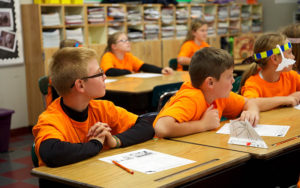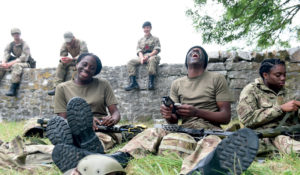Young people and education
Read about our Young people and Education Research Impact Case Studies below.
REF Impact Case Study 2021
- Submitted to: 12 – Engineering
- Submitted title: Computing and Coding Skills for the Next Generation.

Summary
Research at UON working in partnership with local primary and secondary schools has focussed on innovative ways to engage school children with computer coding and programming. The research, led by Dr Scott Turner and Dr Gary Hill, has developed new techniques using robotics and virtual reality to make computer science more engaging for school children. Funded by the East Midlands Development Agency and Northampton Enterprise Limited, Dr Turner’s Junkbots project uses waste material combined with low-cost electronics to build simple robots to embed environmental, engineering, and computational thinking skills into learning activities and problem-solving.
The learning resources from these projects have been made freely available to the National Repository of Computing Education Resources and Code Clubs have been set up in Northamptonshire. In 2015 Dr Turner and Dr Hill established the Young Coders Competition (for 8- to 11-year-olds) in collaboration with the Worshipful Company of Information Technologists, Northamptonshire County Council and Leicester Education Business Company to encourage and reward computer coding competencies and to help address a national shortage in coding ability. In 2016 the competition was recognised by the Green Organisation and won a Green Apple Award for Environmental best practice for innovations focussed on energy saving in schools.
Researchers
- Dr Scott Turner
- Dr Gary Hill
- Dr Anastasios Bakaoukas
- Dr Mu Mu
REF Impact Case Study 2021
- Submitted to: 4 – Psychology, Psychiatry and Neuroscience
- Submitted title: Enhancing children’s agency and resistance strategies in situations of domestic violence and abuse.

Summary
Professor Jane Callaghan was Principal Investigator for Children in Situations of Domestic Abuse (UNARS) (2014-15), a two-year project funded through the European Commission’s Daphne III programme. With partners in Italy, Greece, Spain and England, it was the world’s largest qualitative study of children’s experiences of domestic abuse, focusing specifically on how children cope with, and recover from, domestic abuse. The project has shaped policy and practice in several European countries, the USA, and New Zealand. In the USA, UNARS is extensively used in federal social work guidance for families impacted by domestic abuse, and in the UK UNARS has directly shaped the way children and young people are conceptualised in the Domestic Abuse Bill 2021 for England and Wales.
The key findings from this project highlighted children’s capacity for agency after domestic abuse and their direct lived experience of domestic abuse and coercive control. Drawing from the research, Professor Callaghan has played a key role in lobbying for better recognition of children’s direct experience of domestic abuse to be recognised in policy and practice in order to support children’s recovery more effectively.
Researchers
- Professor Jane Callaghan
- Ms Joanne Alexander
- Dr Judith Sixsmith
- Dr Lisa Fellin
REF Impact Case Study 2021
- Submitted to: 23 – Education
- Submitted title: Project IRIS (Inclusive Research in Irish Schools): transforming special education provision in Ireland

Summary
Professor Richard Rose’s research on special education in Ireland, commissioned by the Government of Ireland’s National Council for Special Education, has directly shaped Irish national policy on special education resource allocation for schools throughout Ireland. This has significantly increased funding to those in need following the adoption of a new more equitable model built upon a needs-based assessment, rather than formal diagnosis.
This model has been rolled out across all schools within Ireland, ensuring that children with complex needs are provided with more effective therapeutic support, in class assistance and specialist equipment where needed. This research further led to the pilot of in-school therapy for special needs children in 150 schools and professional training of an additional 31 practitioners within school therapeutic roles.
Researchers
REF Impact Case Study 2021
- Submitted to: 23 – Education
- Submitted title: Revolutionising parents’ and professionals understanding and skills regarding autism in south east Europe

Summary
Associate Professor David Preece’s three-year Erasmus+ KA2 Strategic partnership in Adult Education: Equity and Social Inclusion through Positive Parenting was based on innovative research that developed and introduced locally accessible education in autism for parents of children with autism and professionals in southeast Europe. During the project parents attended Autism Spectrum Disorder Empowering and Support Teacher workshops and reported increased parental skills, understanding, confidence and happiness. This project has led to long lasting change in Croatia, Cyprus, and North Macedonia.
As part of the research the team created a parent education curriculum and accessible training materials translated into Croatian, Greek and Macedonian. Materials were locally adapted to the particular needs of each community and the content of the curriculum and training reflected current accepted best practice in autism. This project revealed for the first time the significant impact of autism upon families living in southeast Europe and the stigma and isolation that can develop as a result. The impact of this research has supported parents of children with autism, and teachers and professionals working with autistic children.
Researchers
- Associate Professor David Preece
REF Impact Case Study 2021
- Submitted to: 21 – Sociology
- Submitted title: Transforming best practice in services for socially excluded young people.

Summary
Research by the Institute for Social Innovation and Impact (ISII) into youth social exclusion has directly supported the Ministry of Defence, Army Cadet Force, Sea Cadets, RAF Air Cadets, Department of Education, and the Oakhill Secure Training Centre. This research with socially excluded young people has enabled organisations, including the Cadet Forces and G4S to shape their services and interventions by identifying best practice in education and youth justice by shaping the support these individuals receive.
The focus has been on demonstrating the importance of effective and sustainable services for young people at a time when many youth programmes have been cut, developing safeguarding/child-informed processes in secure training centres, research-informed staff development training in managing violence and the development of specialist intervention training. The research identified an alternative vision for youth justice; an opportunity to reframe the debates and narratives to be centred on the young people’s holistic needs, their welfare and rehabilitation in a manner that deals with the underlying causes of their criminal behaviour (abuse, trauma, education, and personal agency etc.) rather than punitive approaches to what society sees as ‘problem’ children.
Researchers
- Dr Meanu Bajwa-Patel
- Associate Professor Claire Paterson-Young
- Professor Richard Hazenberg
REF Impact Case Study 2021
- Submitted to: 27 – English
- Submitted title: Making a Difference: Poet/Composer collaboration to enhance cultural and education capacity in young people through song.

Summary
Dr Charles Bennett’s research into poetry in choral settings has contributed to the growing interest and recognition of music and song in contributing towards wellbeing. Bennett’s work has included librettos commissioned by pre-eminent composer Bob Chilcott. Bennett writes the lyric first, and Chilcott’s composition, and subsequent rehearsals and performances, are dedicated to conveying its meaning.
Choral music has been created specifically for young people incorporating exciting elements, memorable melody, and an underlying serious message. Five Days that Changed the World framed a series of dramatic monologues pinpointing significant dates in history such as the invention of printing, the abolition of slavery, the invention of powered flight, the discovery of penicillin and the first person in space. The young people singing in these choirs benefitted from opportunities for participation in the experience of live music making and extending this to others through subsequent sales of the music for use in other choral settings.
Age UK Oxfordshire commissioned The Voyage, as part of their campaign to end loneliness. This project was successful in increasing community participation with the rehearsal process and performance bringing young and older people together. Performers, commissioners, and conductors as well as audience members expressed a profound connection with the lyric, demonstrating that everyone could engage to generate meaning and reflection from Bennett’s work.
Researchers
- Dr Charles Bennett